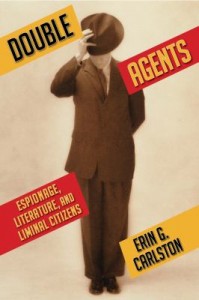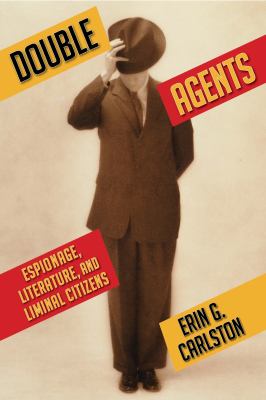 Double Agents: Espionage, Literature,
Double Agents: Espionage, Literature,
and Liminal Citizens
by Erin G. Carlston
Columbia University Press. 332 pages, $29.50
THIS ENGAGING STUDY investigates the many associations that have been drawn, in both literary works and historical events, between gay men, Jews, and communists as potential traitors and spies. They are among the “invisible others,” as Carlston calls them, who have been considered throughout history, but especially in the 19th and 20th centuries, as “double agents,” pretending to be citizens but actually working as moles and subversives. Based upon their sexual orientation, religious and ethnic background, or political leanings, these groups are seen as not respecting national boundaries or secrets; therefore, they cannot be trusted with the rights of full citizenship. Often there is sense of urgency to identify members of these groups to prevent them from hurting the country.
Carlston examines three major events from the last hundred years or so, from three separate countries, to illustrate her thesis: the Dreyfus Affair in late-19th-century France; the Burgess-Maclean spy scandal in Britain; and the Julius and Ethel Rosenberg trial in the U.S. She also analyzes three literary works that deal in some way with each event, as well as the general theme—Proust’s In Search of Lost Time, Auden’s early poetry, and Tony Kushner’s play Angels in America—which all consider what it means to be gay, Jewish, or a communist, often more than one at a time. Carlston focuses primarily on Proust and Kushner’s works, using Auden’s early poetry to demonstrate that many writers at the time, even poets, were interested in spying as a theme.
He begins with Proust, mainly focusing on Sodom and Gomorrah, which is Volume Four of the massive novel. Proust refers to the Dreyfus Affair—an 1894 spy scandal involving a Jewish army officer accused of selling military secrets to a bisexual German diplomat—as a way of bringing together sexuality and Jewishness as two kinds of “secret” identity. In the book, the straight, Catholic narrator suddenly discovers the hidden signs of Jewishness and homosexuality (or “inversion” as it was called), and uses this new understanding to piece together the fragments of conversation and information he learned about people in the earlier volumes to gain a fuller picture of them.
In a sense, Marcel, the narrator, acts as a spy, examining people and situations for the secret clues that reveal their identity. The readers then become spies as well as they learn to decode history and relationships and discover the truth. And as a closeted gay man and assimilated Jew, Proust had a unique perspective on this situation. He was a sort of spy himself, looking at salon society through the eyes of a partially concealed outsider. In this respect, Jewishness and homosexuality provide a unique way of looking at the world that “insiders” would be likely to miss.
Carlston continues this analysis in her discussion of Angels in America, particularly the play’s use of Ethel Rosenberg and Roy Cohn. In examining the 1951 trial of the Rosenbergs for passing atomic bomb secrets to the Russians, she remarks on the irony that Cohn, a Jew and a closeted homosexual, helped prosecute Julius and Ethel, fellow Jews and believers in Communism. She argues that Cohn worked so hard against them in order to reinforce his status as an assimilated Jew who had successfully become a part of mainstream America, whereas Julius and Ethel were still on the margins, working for social justice and involved with a group fighting against American creeds.
While Cohn easily comes across in the play as an evil self-hating Jew and gay man, Carlston sees some positive signs in his resolve to be a “tough Jew,” to prosper in a world that has always feared and despised people like him. Perhaps Ethel visits him during his last days because he, too, is a spy, looking at the world through an alien perspective. Through close readings, Carlston draws logical yet unexpected conclusions like these.






